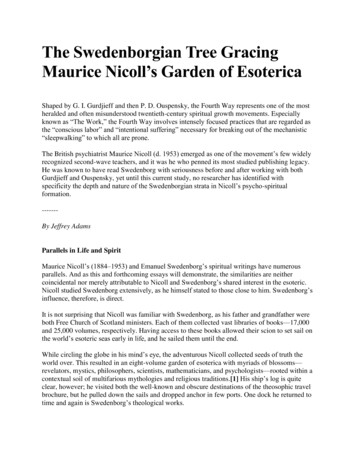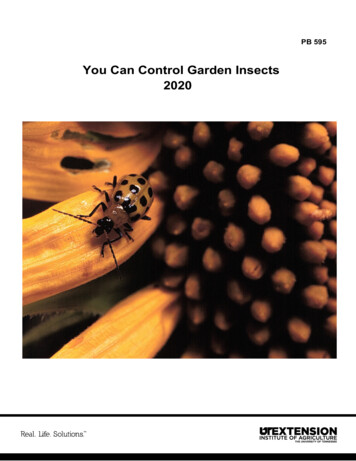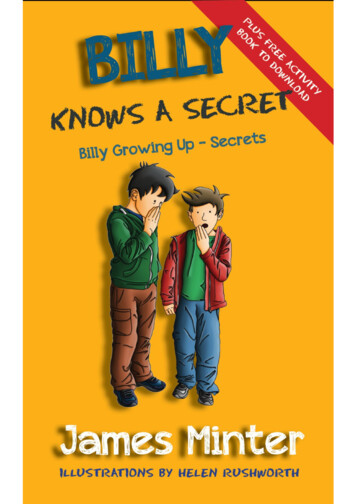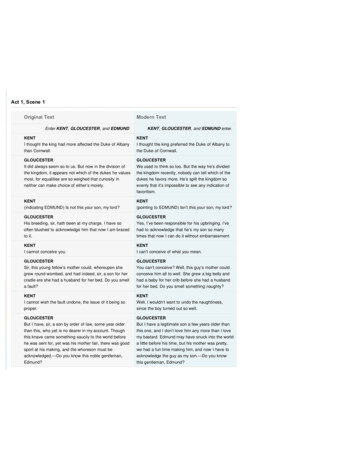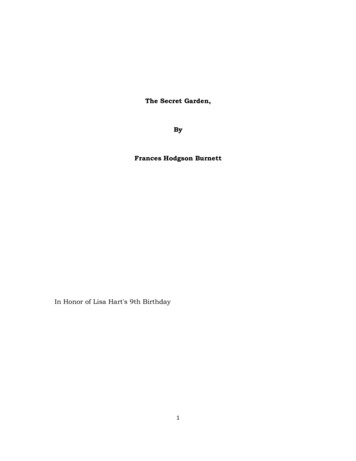
Transcription
The Secret Garden,ByFrances Hodgson BurnettIn Honor of Lisa Hart's 9th Birthday1
CONTENTSCHAPTER TITLEI THERE IS NO ONE LEFTII MISTRESS MARY QUITE CONTRARYIII ACROSS THE MOORIV MARTHAV THE CRY IN THE CORRIDORVI "THERE WAS SOME ONE CRYING--THERE WAS!"VII THE KEY TO THE GARDENVIII THE ROBIN WHO SHOWED THE WAYIX THE STRANGEST HOUSE ANY ONE EVER LIVED INX DICKONXI THE NEST OF THE MISSEL THRUSHXII "MIGHT I HAVE A BIT OF EARTH?"XIII "I AM COLIN"XIV A YOUNG RAJAHXV NEST BUILDINGXVI "I WON'T!" SAID MARYXVII A TANTRUMXVIII "THA' MUNNOT WASTE NO TIME"XIX "IT HAS COME!"2
XX "I SHALL LIVE FOREVER--AND EVER--AND EVER!"XXI BEN WEATHERSTAFFXXII WHEN THE SUN WENT DOWNXXIII MAGICXIV "LET THEM LAUGH"XXV THE CURTAINXXVI "IT'S MOTHER!"XXVII IN THE GARDENTHE SECRET GARDENBY FRANCES HODGSON BURNETT3
CHAPTER ITHERE IS NO ONE LEFTWhen Mary Lennox was sent to Misselthwaite Manor to live with her uncleeverybody said she was the most disagreeable-looking child ever seen.It was true, too. She had a little thin face and a little thin body,thin light hair and a sour expression. Her hair was yellow, and herface was yellow because she had been born in India and had always beenill in one way or another. Her father had held a position under theEnglish Government and had always been busy and ill himself, and hermother had been a great beauty who cared only to go to parties andamuse herself with gay people. She had not wanted a little girl atall, and when Mary was born she handed her over to the care of an Ayah,who was made to understand that if she wished to please the Mem Sahibshe must keep the child out of sight as much as possible. So when shewas a sickly, fretful, ugly little baby she was kept out of the way,and when she became a sickly, fretful, toddling thing she was kept outof the way also. She never remembered seeing familiarly anything butthe dark faces of her Ayah and the other native servants, and as theyalways obeyed her and gave her her own way in everything, because theMem Sahib would be angry if she was disturbed by her crying, by thetime she was six years old she was as tyrannical and selfish a littlepig as ever lived. The young English governess who came to teach herto read and write disliked her so much that she gave up her place in4
three months, and when other governesses came to try to fill it theyalways went away in a shorter time than the first one. So if Mary hadnot chosen to really want to know how to read books she would neverhave learned her letters at all.One frightfully hot morning, when she was about nine years old, sheawakened feeling very cross, and she became crosser still when she sawthat the servant who stood by her bedside was not her Ayah."Why did you come?" she said to the strange woman. "I will not let youstay. Send my Ayah to me."The woman looked frightened, but she only stammered that the Ayah couldnot come and when Mary threw herself into a passion and beat and kickedher, she looked only more frightened and repeated that it was notpossible for the Ayah to come to Missie Sahib.There was something mysterious in the air that morning. Nothing wasdone in its regular order and several of the native servants seemedmissing, while those whom Mary saw slunk or hurried about with ashy andscared faces. But no one would tell her anything and her Ayah did notcome. She was actually left alone as the morning went on, and at lastshe wandered out into the garden and began to play by herself under atree near the veranda. She pretended that she was making a flower-bed,and she stuck big scarlet hibiscus blossoms into little heaps of earth,all the time growing more and more angry and muttering to herself the5
things she would say and the names she would call Saidie when shereturned."Pig! Pig! Daughter of Pigs!" she said, because to call a native a pigis the worst insult of all.She was grinding her teeth and saying this over and over again when sheheard her mother come out on the veranda with some one. She was with afair young man and they stood talking together in low strange voices.Mary knew the fair young man who looked like a boy. She had heard thathe was a very young officer who had just come from England. The childstared at him, but she stared most at her mother. She always did thiswhen she had a chance to see her, because the Mem Sahib--Mary used tocall her that oftener than anything else--was such a tall, slim, prettyperson and wore such lovely clothes. Her hair was like curly silk andshe had a delicate little nose which seemed to be disdaining things,and she had large laughing eyes. All her clothes were thin andfloating, and Mary said they were "full of lace." They looked fuller oflace than ever this morning, but her eyes were not laughing at all.They were large and scared and lifted imploringly to the fair boyofficer's face."Is it so very bad? Oh, is it?" Mary heard her say."Awfully," the young man answered in a trembling voice. "Awfully, Mrs.Lennox. You ought to have gone to the hills two weeks ago."6
The Mem Sahib wrung her hands."Oh, I know I ought!" she cried. "I only stayed to go to that sillydinner party. What a fool I was!"At that very moment such a loud sound of wailing broke out from theservants' quarters that she clutched the young man's arm, and Marystood shivering from head to foot. The wailing grew wilder and wilder."What is it? What is it?" Mrs. Lennox gasped."Some one has died," answered the boy officer. "You did not say it hadbroken out among your servants.""I did not know!" the Mem Sahib cried. "Come with me! Come with me!"and she turned and ran into the house.After that, appalling things happened, and the mysteriousness of themorning was explained to Mary. The cholera had broken out in its mostfatal form and people were dying like flies. The Ayah had been takenill in the night, and it was because she had just died that theservants had wailed in the huts. Before the next day three otherservants were dead and others had run away in terror. There was panicon every side, and dying people in all the bungalows.During the confusion and bewilderment of the second day Mary hid7
herself in the nursery and was forgotten by everyone. Nobody thoughtof her, nobody wanted her, and strange things happened of which sheknew nothing. Mary alternately cried and slept through the hours. Sheonly knew that people were ill and that she heard mysterious andfrightening sounds. Once she crept into the dining-room and found itempty, though a partly finished meal was on the table and chairs andplates looked as if they had been hastily pushed back when the dinersrose suddenly for some reason. The child ate some fruit and biscuits,and being thirsty she drank a glass of wine which stood nearly filled.It was sweet, and she did not know how strong it was. Very soon itmade her intensely drowsy, and she went back to her nursery and shutherself in again, frightened by cries she heard in the huts and by thehurrying sound of feet. The wine made her so sleepy that she couldscarcely keep her eyes open and she lay down on her bed and knewnothing more for a long time.Many things happened during the hours in which she slept so heavily,but she was not disturbed by the wails and the sound of things beingcarried in and out of the bungalow.When she awakened she lay and stared at the wall. The house wasperfectly still. She had never known it to be so silent before. Sheheard neither voices nor footsteps, and wondered if everybody had gotwell of the cholera and all the trouble was over. She wondered alsowho would take care of her now her Ayah was dead. There would be a newAyah, and perhaps she would know some new stories. Mary had been8
rather tired of the old ones. She did not cry because her nurse haddied. She was not an affectionate child and had never cared much forany one. The noise and hurrying about and wailing over the cholera hadfrightened her, and she had been angry because no one seemed toremember that she was alive. Everyone was too panic-stricken to thinkof a little girl no one was fond of. When people had the cholera itseemed that they remembered nothing but themselves. But if everyonehad got well again, surely some one would remember and come to look forher.But no one came, and as she lay waiting the house seemed to grow moreand more silent. She heard something rustling on the matting and whenshe looked down she saw a little snake gliding along and watching herwith eyes like jewels. She was not frightened, because he was aharmless little thing who would not hurt her and he seemed in a hurryto get out of the room. He slipped under the door as she watched him."How queer and quiet it is," she said. "It sounds as if there were noone in the bungalow but me and the snake."Almost the next minute she heard footsteps in the compound, and then onthe veranda. They were men's footsteps, and the men entered thebungalow and talked in low voices. No one went to meet or speak tothem and they seemed to open doors and look into rooms. "Whatdesolation!" she heard one voice say. "That pretty, pretty woman! Isuppose the child, too. I heard there was a child, though no one ever9
saw her."Mary was standing in the middle of the nursery when they opened thedoor a few minutes later. She looked an ugly, cross little thing andwas frowning because she was beginning to be hungry and feeldisgracefully neglected. The first man who came in was a large officershe had once seen talking to her father. He looked tired and troubled,but when he saw her he was so startled that he almost jumped back."Barney!" he cried out. "There is a child here! A child alone! In aplace like this! Mercy on us, who is she!""I am Mary Lennox," the little girl said, drawing herself up stiffly.She thought the man was very rude to call her father's bungalow "Aplace like this!" "I fell asleep when everyone had the cholera and Ihave only just wakened up. Why does nobody come?""It is the child no one ever saw!" exclaimed the man, turning to hiscompanions. "She has actually been forgotten!""Why was I forgotten?" Mary said, stamping her foot. "Why does nobodycome?"The young man whose name was Barney looked at her very sadly. Maryeven thought she saw him wink his eyes as if to wink tears away.10
"Poor little kid!" he said. "There is nobody left to come."It was in that strange and sudden way that Mary found out that she hadneither father nor mother left; that they had died and been carriedaway in the night, and that the few native servants who had not diedalso had left the house as quickly as they could get out of it, none ofthem even remembering that there was a Missie Sahib. That was why theplace was so quiet. It was true that there was no one in the bungalowbut herself and the little rustling snake.11
CHAPTER IIMISTRESS MARY QUITE CONTRARYMary had liked to look at her mother from a distance and she hadthought her very pretty, but as she knew very little of her she couldscarcely have been expected to love her or to miss her very much whenshe was gone. She did not miss her at all, in fact, and as she was aself-absorbed child she gave her entire thought to herself, as she hadalways done. If she had been older she would no doubt have been veryanxious at being left alone in the world, but she was very young, andas she had always been taken care of, she supposed she always would be.What she thought was that she would like to know if she was going tonice people, who would be polite to her and give her her own way as herAyah and the other native servants had done.She knew that she was not going to stay at the English clergyman'shouse where she was taken at first. She did not want to stay. TheEnglish clergyman was poor and he had five children nearly all the sameage and they wore shabby clothes and were always quarreling andsnatching toys from each other. Mary hated their untidy bungalow andwas so disagreeable to them that after the first day or two nobodywould play with her. By the second day they had given her a nicknamewhich made her furious.12
It was Basil who thought of it first. Basil was a little boy withimpudent blue eyes and a turned-up nose, and Mary hated him. She wasplaying by herself under a tree, just as she had been playing the daythe cholera broke out. She was making heaps of earth and paths for agarden and Basil came and stood near to watch her. Presently he gotrather interested and suddenly made a suggestion."Why don't you put a heap of stones there and pretend it is a rockery?"he said. "There in the middle," and he leaned over her to point."Go away!" cried Mary. "I don't want boys. Go away!"For a moment Basil looked angry, and then he began to tease. He wasalways teasing his sisters. He danced round and round her and madefaces and sang and laughed."Mistress Mary, quite contrary,How does your garden grow?With silver bells, and cockle shells,And marigolds all in a row."He sang it until the other children heard and laughed, too; and thecrosser Mary got, the more they sang "Mistress Mary, quite contrary";and after that as long as she stayed with them they called her"Mistress Mary Quite Contrary" when they spoke of her to each other,and often when they spoke to her.13
"You are going to be sent home," Basil said to her, "at the end of theweek. And we're glad of it.""I am glad of it, too," answered Mary. "Where is home?""She doesn't know where home is!" said Basil, with seven-year-oldscorn. "It's England, of course. Our grandmama lives there and oursister Mabel was sent to her last year. You are not going to yourgrandmama. You have none. You are going to your uncle. His name isMr. Archibald Craven.""I don't know anything about him," snapped Mary."I know you don't," Basil answered. "You don't know anything. Girlsnever do. I heard father and mother talking about him. He lives in agreat, big, desolate old house in the country and no one goes near him.He's so cross he won't let them, and they wouldn't come if he would letthem. He's a hunchback, and he's ho
THE SECRET GARDEN BY FRANCES HODGSON BURNETT . 4 CHAPTER I THERE IS NO ONE LEFT When Mary Lennox was sent to Misselthwaite Manor to live with her uncle everybody said she was the most disagreeable-looking child ever seen. It was true, too. She had a little thin face and a little thin body, thin light hair and a sour expression. Her hair was yellow, and her face was yellow because she


